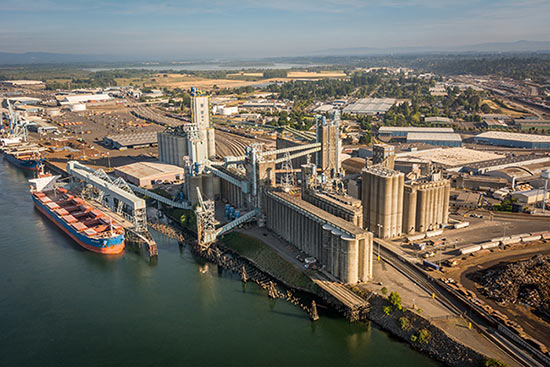
Prior to voting on the Port of Vancouver USA’s 2020 budget and the Port’s tax levy during Board of Commissioners meeting on Nov. 26, Commissioner Jerry Oliver stated that he would like to make a comment that he would be opposing each of the resolutions pertaining to the budget, “as has been my want for the past 12 years.”
The $58.6 million budget, which was approved by a 2-1 vote during the Nov. 26 meeting, includes a tax levy increase of 1% and use of the Port’s banked capacity. This is the first time Port taxes will increase since 2013.
“Year one I ran against taxes to be elected to this board,” Oliver said. “I’ve generally been in opposition to tax increases … I have strong feelings about what the financing of a port should be about. I feel we should generate sufficient revenue and hold expenses sufficiently low to meet our obligations. I also wish to assert that this in no way denigrates what I consider to be a remarkable staff; it’s a difference of opinion, and reasonable people may differ.”
According to a news release from the Port, the 2020 budget was developed to meet several overarching goals of the Strategic Plan, including strengthening the Port’s financial sustainability, addressing the long-term use of taxes and implementing a comprehensive maintenance plan.
The use of the Port’s banked capacity and the tax levy increase of 1% “will help move three key initiatives forward in the coming year,” according to the news release.
“In the coming year, we’ll take action on our Terminal 1 waterfront development project, maintenance of our Port assets, and infrastructure improvements to bring new business and jobs to our region,” said Julianna Marler, Port of Vancouver USA CEO. “These initiatives will help ensure that the community continues to see a strong return on their Port investments.”
According to the news release, each year tax dollars paid to the Port are used exclusively for environmental remediation, repayment of general obligation bonds and to build and improve facilities. In 2018, the Port saw a 13 to 1 return on investment. This means that for every tax dollar paid to the port, $13 is generated to support the public services like roads, schools, police and fire services.
The remainder of the Port’s expenses, including operations and staff salaries, are funded by marine and industrial activities. In 2018, these business lines supported nearly $3.8 billion in economic value to the region, a $900 million increase since 2014, according to the news release.
“We took an extremely thoughtful approach to our 2020 budget process, working to maximize every dollar to move our strategic goals forward,” Marler said. “Our budget reflects our strong vision of growing economic opportunity in our region, and supporting the needs of our community and the environment.”
Before voting on the 2020 budget during the Nov. 26 meeting, the commissioners opened up the meeting for public comment on the budget. One citizen, Patricia Page, addressed the commissioners and brought up some concerns she had about the proposed budget, including that she found the budget difficult to track expenses between departments; that there were no easily identifiable numbers in the budget that related to environmental considerations; and that she noticed that the Port spent a good deal of money on consultants.
All of the commissioners addressed Page’s concerns about the budget.
“I shared your challenge of tracking (between departments),” Commissioner Don Orange said. “I’m going to ask that we do a little bit so that we can understand tracking from year to year … and your third thing, consultants are used for all sorts of things, the general answer to that is they are used for things that the skill set doesn’t exist on the staff. You have a pertinent point.”
“In terms of consultants, we have a fantastic staff, but it does give us the opportunity to bring in, kind of, up-to-the-minute, state-of-the-art professionals with a lot of additional expertise,” Commissioner Eric LaBrant said, addressing Page’s concerns.
Oliver also addressed Page’s concerns about the Port’s use of consultants, stating that there are areas where help is needed that exceed the skill set of the staff.
“An example, and it’s an extreme example, the Port has almost no experience in building office buildings and designing plazas and raising up hotels, and for an overall master plan we sought and selected the services of an international organization skilled in that,” Oliver said.
“We are continuously monitoring staffing levels and the use of consultants, and as the commissioners have mentioned, we use consultants for specific expertise,” Marler said. “If we see that that is an ongoing expertise needed on a regular basis, then we’ll evaluate whether it makes sense to bring a staff person on board for that specific expertise.”
For more information about the 2020 budget, the budgeting process and how tax dollars are invested in the community, visit www.portvanusa.com/about/budget/.




